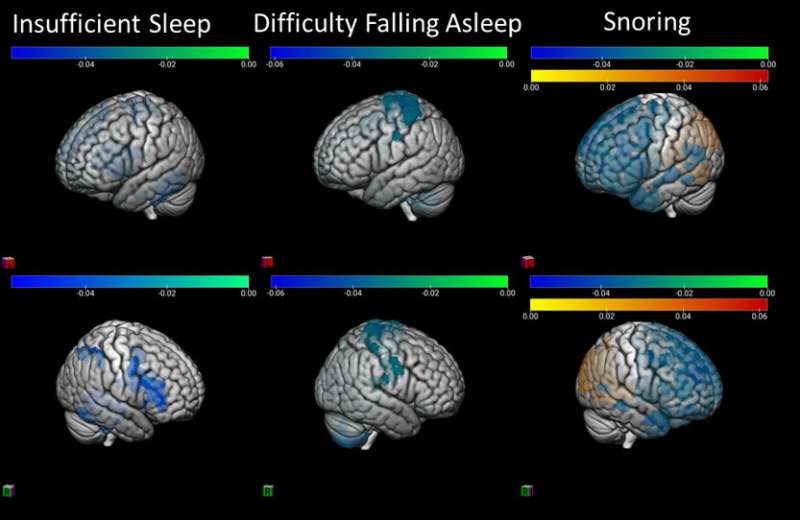Inadequate sleep is bad for preteens' brains

We all know that if we don't get enough sleep or don't sleep well, we won't be on top of our game the next day. And we know that many teens and preteens get too little or poor-quality sleep. Now, a large, first-of-its kind study from Boston Children's Hospital spells out in detail how inadequate sleep can jeopardize brain organization in early adolescence. Findings appear in the journalCerebral Cortex Communications.
"Early adolescence is a critical time inbrain development," says lead researcher Caterina Stamoulis, Ph.D., who directs the Computational Neuroscience Laboratory at Boston Children's. "Preteens' brain circuits are rapidly maturing, particularly those supporting higher-level thought processes like decision-making, problem-solving, and the ability to process and integrate information from the outside world. We show thatinadequate sleepcould have enormous implications for cognitive and mental health for individual children and at the population level."
Stamoulis, with research assistant Skylar Brooks and Eliot Katz, MD, a physician in Boston Children's Sleep Center, analyzed sleep and brain imaging data from more than 5,500 early adolescents (ages 9 to 11 years). The data are from the long-running, NIH-funded Adolescent Brain Cognitive Development (ABCD) study.
The sleep data were reported by parents on a 26-item survey with questions on sleep duration, sleep latency (time it typically takes the child to fall asleep), waking from sleep, difficulty falling back to sleep, difficulty breathing, snoring, nightmares, difficulty waking up, daytime sleepiness, and more.
The brain data came from functional magnetic resonance imaging (fMRI) performed at rest, independent of any task. From these data, the researchers identified multiple brain networks that play fundamental roles in cognitive function. They then examined the networks' properties—which reflect how efficiently the brain processes information and how resilient its circuitry is to stressors—as a function of sleep quantity and quality.
A rigorous computational analysis revealed that shorter sleep duration, longer sleep latency, frequent waking, and sleep-disordered breathing were associated with less efficient, flexible, and resilient brain networks. The researchers also observed abnormal network changes in specific parts of the brain: Multiple cortical areas as well as the thalamus, basal ganglia, hippocampus, and cerebellum. The detrimental effects were widespread, from individual regions of the brain to large-scale circuits and the entirebrain, and many appeared to be independent of unhealthy weight, which also negatively affected sleep quantity and quality.
我们确定可以poten的“网络异常tially lead to deficits in multiple cognitive processes, including attention, reward, emotional regulation, memory, and the ability to plan, coordinate, and control actions and behaviors," says Stamoulis.
The study also found racial disparities. Shorter sleep times and reduced sleep quality had disproportionate unhealthy effects onbrain networksin non-white participants, who comprised about a third of the sample.
Additional findings on sleep:
- Girls slept less than boys, averaging 8 to 9 hours of sleep as compared with 9-11 hours for boys. They also took longer to fall asleep.
- Non-white children slept less than white children, averaging 8 to 9 hours versus 9 to 11 hours.
- Higher family income was significantly associated with longer sleep duration
- Longer screen time were significantly associated with shorter sleep duration
- Being overweight was associated with shorter sleep duration, more movement during the night, sweating, snoring, difficulty waking, and daytime sleepiness.
Explore further















